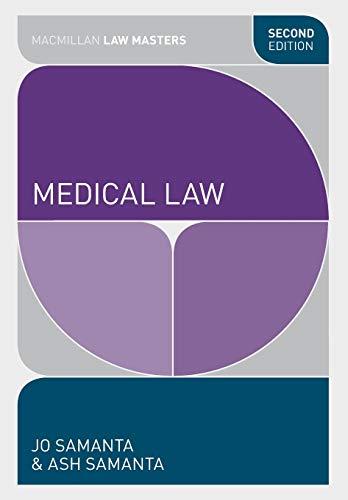Question
We act for the defendant, M, who is the mother of the plaintiff K. The suit property was registered in the names of M and
We act for the defendant, M, who is the mother of the plaintiff K. The suit property was registered in the names of M and K as joint tenants in 2005 (nothing was mentioned about the beneficial ownership in the assignment). equity follows the law: presumed to be beneficial JT
M has four sons, K being the eldest. Her husband passed away in 2004 leaving behind relatively huge debts. So the first family home, which was acquired in M's sole name, was sold in 2005 so that part of the proceeds could be used to pay off his debts. The rest of the proceeds were used to acquire the suit property. M said she was getting old and she thought adding K's name would make it easier to obtain a mortgage loan. M and her four sons all moved into the suit property upon completion of the purchase. M said she was the one paying for the mortgage.
M was upset when she found out that K was gambling heavily in about 2006 and incurred quite some debts as a result. K made use of the suit property to obtain a mortgage loan from a moneylender in October 2009 without M's prior knowledge. The mortgage agreement was registered with the Land Registry in December 2009. M was worried that K might "ruin himself through addictive gambling", just like his father (M's husband). M also feared that K's creditors might "lay their hands on the suit property for repayment". She asked her youngest son, S, for help. S (who is not legally trained) tried to search for a solution on the internet, which resulted in his learning about serving a notice to sever a joint tenancy. S therefore instructed a law firm to issue a Notice of Severance on M's behalf, even though neither S nor M was sure about the purpose or effect of such a notice. The Notice of Severance was dated 13 March 2010, served on K on the same day, and registered with the Land Registry on 12 May 2010. In June 2010, M made a will leaving all her property to her other three sons equally.
K has moved out of the suit property and demanded an immediate sale of the property, claiming "his share of the proceeds of sale". M, who is still living there with her other sons, does not want to sell the property or share any proceeds with K. She disputes K's entitlement to the property.
Advise M on whether and how she could defend K's claim and whether she is entitled to leave the entire suit property to her other three sons by will.
Can anyone clarify that severing equitable joint tenancy by M and severance of legal joint tenancy by K, what will be the effect on M's claim?
Step by Step Solution
There are 3 Steps involved in it
Step: 1

Get Instant Access to Expert-Tailored Solutions
See step-by-step solutions with expert insights and AI powered tools for academic success
Step: 2

Step: 3

Ace Your Homework with AI
Get the answers you need in no time with our AI-driven, step-by-step assistance
Get Started


